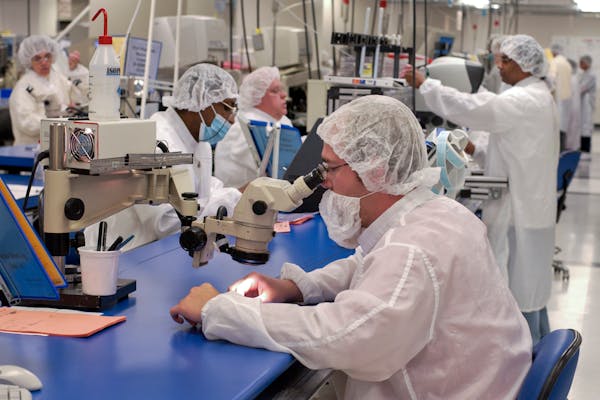An effort to strengthen Minnesota's health care and life-sciences businesses missed out on the latest round of federal funding for designated technology hubs, but economic development officials are hopeful it will receive money in the future.
Minnesota MedTech 3.0 is among 31 tech hubs selected in October by the U.S. Department of Commerce, which made it eligible to compete for significant funding. The group behind the proposed hub asked for $60 million.
The Commerce Department on Tuesday announced $504 million in funding for 12 hubs, including $49 million for the Wisconsin Biotech Health Hub.
Commerce officials said if more money becomes available, it plans to invest in additional hubs.
Minnesota med-tech professionals remain confident in the long-term goals.
"I think there will be other opportunities for the funding. I think we're going to still work on building the ecosystem for startups," said Ping Yeh, CEO of Arden Hills-based Vocxi Health Inc.
Vocxi is developing a device that can diagnose lung cancer based on a patient's breath.
Greater MSP, which led the MedTech 3.0 collaboration, pledged this year to press forward with its plans even if federal funding was not secured.
"While we're disappointed in the decision [this week], we are undeterred in our pursuit," Peter Frosch, CEO of Greater MSP, said in a statement. "We will continue working to receive the next round of federal funding, but we are not waiting to act.
"Working together in the months to come, we will build the country's leading health data alliance for medical innovation, incubate hundreds of high-growth startup companies and create great careers for thousands of Minnesotans."
Greater MSP has already secured pledges of more than $65 million in direct and in-kind contributions from partners. MedTech 3.0 envisions support for startups, workforce development and technological advancement.
Frosch credits Medtronic CEO Geoff Martha with approaching Greater MSP in 2023 with the med-tech hub idea.
"We earned America's Tech Hubs designation because we have the country's best strategy for growing the future of med-tech. That hasn't changed," Martha said. "The world needs better health care solutions that are more accessible and affordable."

Why now might be the best time to make a deal on boats, ATVs and other powersports

To reset downtown Minneapolis skyway life, building owners cut deals with retailers

Ramstad: AI is English-centric, but it's picking up Hmong quickly
Don't throw away perks that come with insurance and memberships

